The Role of Nurses in Transformational Healthcare Changes in Singapore
VerifiedAdded on 2022/08/16
|8
|2241
|13
Report
AI Summary
This report examines the evolving healthcare environment of Singapore, highlighting challenges such as an aging population, chronic diseases, and workforce shortages. It emphasizes the critical role of nurses in leading transformational changes to improve patient care and outcomes. The report discusses how nurse managers can foster critical thinking, promote interprofessional collaboration, and drive patient-centered care. It also explores the need for nurses to adopt new roles, utilize data and technology, and contribute to quality improvement initiatives within the healthcare system. The report concludes by emphasizing the importance of continuous professional development and innovative leadership to meet the demands of Singapore's changing healthcare landscape. The report stresses the need for nurses to move beyond episodic care and focus on maintaining health and safety across the care continuum.
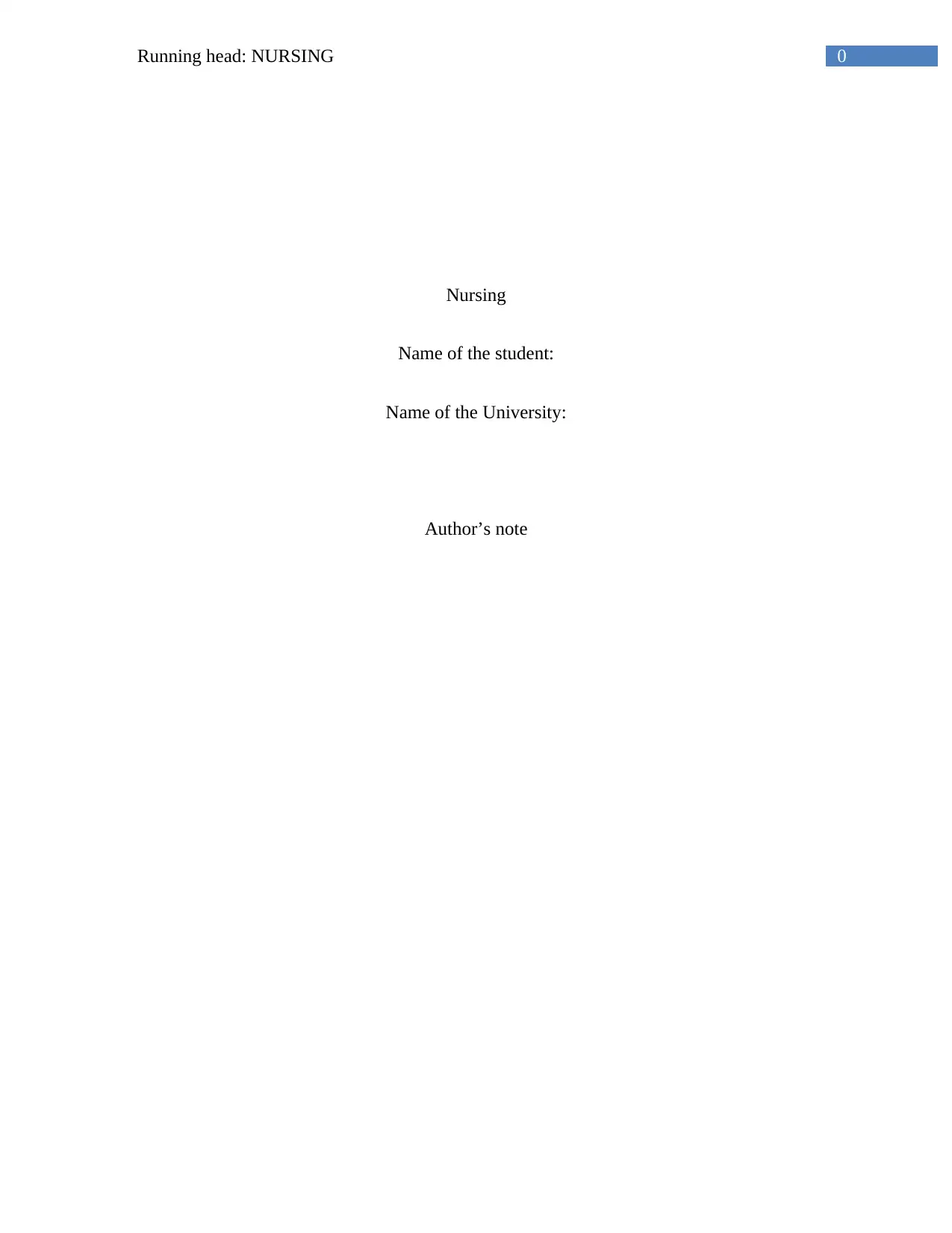
0Running head: NURSING
Nursing
Name of the student:
Name of the University:
Author’s note
Nursing
Name of the student:
Name of the University:
Author’s note
Paraphrase This Document
Need a fresh take? Get an instant paraphrase of this document with our AI Paraphraser
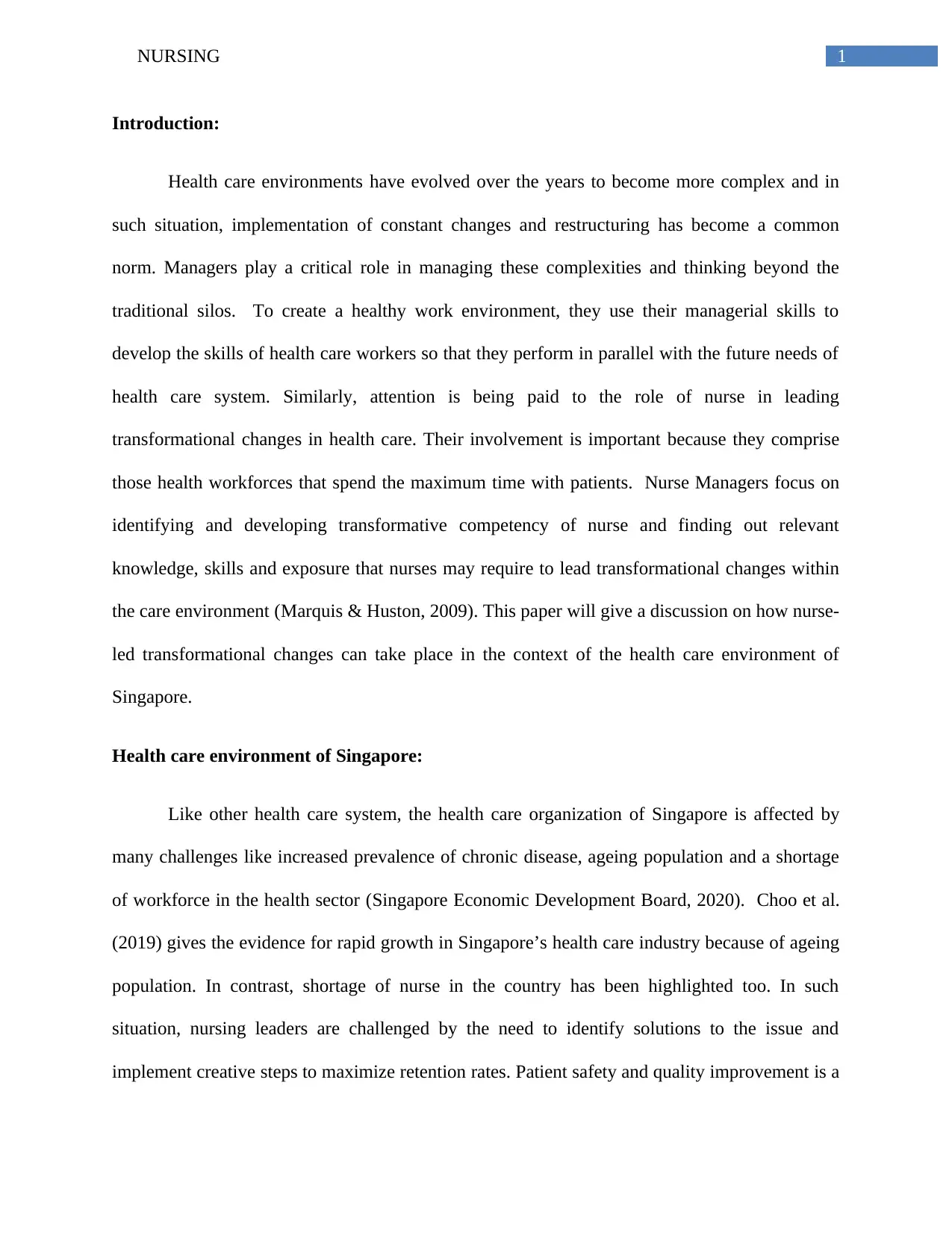
1NURSING
Introduction:
Health care environments have evolved over the years to become more complex and in
such situation, implementation of constant changes and restructuring has become a common
norm. Managers play a critical role in managing these complexities and thinking beyond the
traditional silos. To create a healthy work environment, they use their managerial skills to
develop the skills of health care workers so that they perform in parallel with the future needs of
health care system. Similarly, attention is being paid to the role of nurse in leading
transformational changes in health care. Their involvement is important because they comprise
those health workforces that spend the maximum time with patients. Nurse Managers focus on
identifying and developing transformative competency of nurse and finding out relevant
knowledge, skills and exposure that nurses may require to lead transformational changes within
the care environment (Marquis & Huston, 2009). This paper will give a discussion on how nurse-
led transformational changes can take place in the context of the health care environment of
Singapore.
Health care environment of Singapore:
Like other health care system, the health care organization of Singapore is affected by
many challenges like increased prevalence of chronic disease, ageing population and a shortage
of workforce in the health sector (Singapore Economic Development Board, 2020). Choo et al.
(2019) gives the evidence for rapid growth in Singapore’s health care industry because of ageing
population. In contrast, shortage of nurse in the country has been highlighted too. In such
situation, nursing leaders are challenged by the need to identify solutions to the issue and
implement creative steps to maximize retention rates. Patient safety and quality improvement is a
Introduction:
Health care environments have evolved over the years to become more complex and in
such situation, implementation of constant changes and restructuring has become a common
norm. Managers play a critical role in managing these complexities and thinking beyond the
traditional silos. To create a healthy work environment, they use their managerial skills to
develop the skills of health care workers so that they perform in parallel with the future needs of
health care system. Similarly, attention is being paid to the role of nurse in leading
transformational changes in health care. Their involvement is important because they comprise
those health workforces that spend the maximum time with patients. Nurse Managers focus on
identifying and developing transformative competency of nurse and finding out relevant
knowledge, skills and exposure that nurses may require to lead transformational changes within
the care environment (Marquis & Huston, 2009). This paper will give a discussion on how nurse-
led transformational changes can take place in the context of the health care environment of
Singapore.
Health care environment of Singapore:
Like other health care system, the health care organization of Singapore is affected by
many challenges like increased prevalence of chronic disease, ageing population and a shortage
of workforce in the health sector (Singapore Economic Development Board, 2020). Choo et al.
(2019) gives the evidence for rapid growth in Singapore’s health care industry because of ageing
population. In contrast, shortage of nurse in the country has been highlighted too. In such
situation, nursing leaders are challenged by the need to identify solutions to the issue and
implement creative steps to maximize retention rates. Patient safety and quality improvement is a
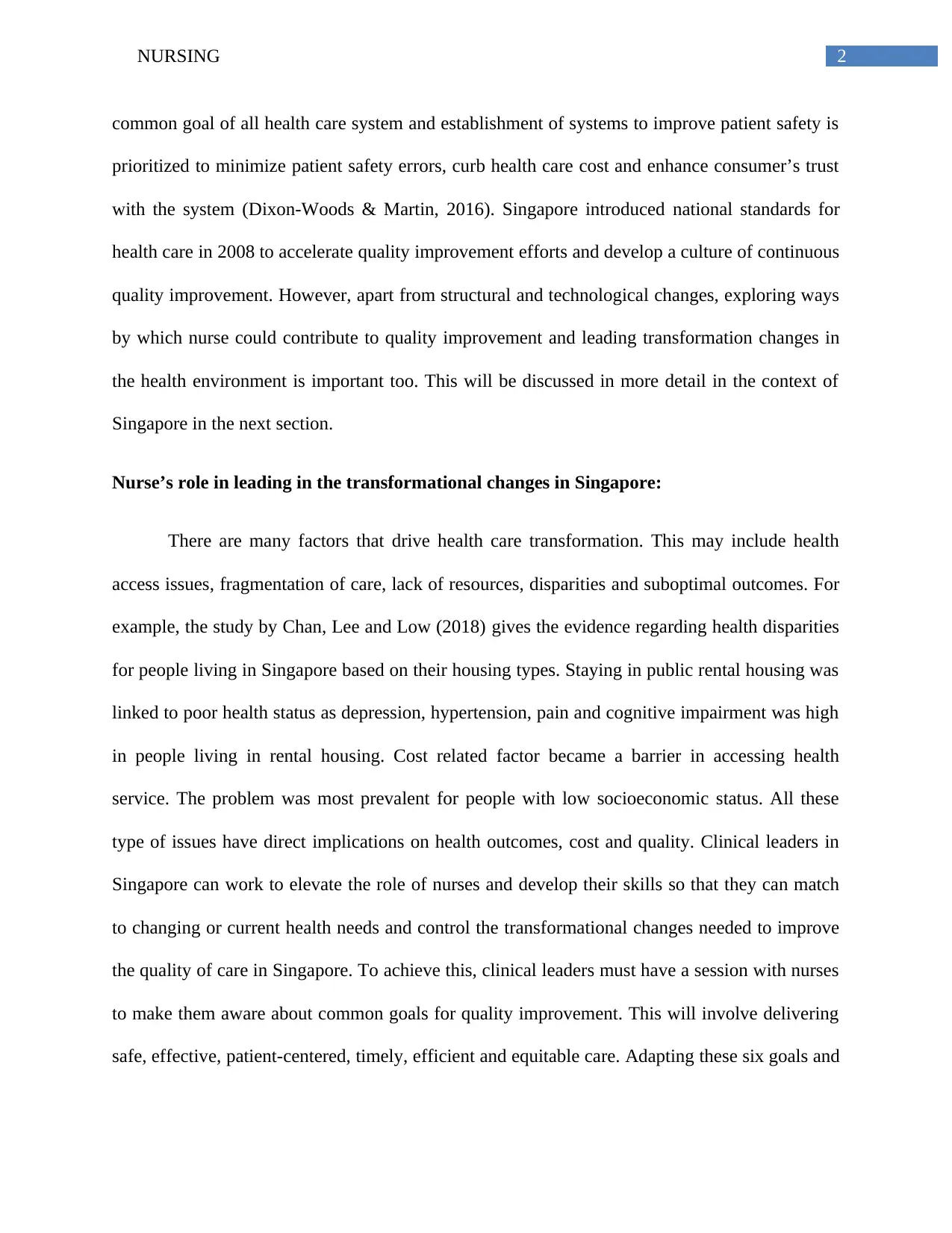
2NURSING
common goal of all health care system and establishment of systems to improve patient safety is
prioritized to minimize patient safety errors, curb health care cost and enhance consumer’s trust
with the system (Dixon-Woods & Martin, 2016). Singapore introduced national standards for
health care in 2008 to accelerate quality improvement efforts and develop a culture of continuous
quality improvement. However, apart from structural and technological changes, exploring ways
by which nurse could contribute to quality improvement and leading transformation changes in
the health environment is important too. This will be discussed in more detail in the context of
Singapore in the next section.
Nurse’s role in leading in the transformational changes in Singapore:
There are many factors that drive health care transformation. This may include health
access issues, fragmentation of care, lack of resources, disparities and suboptimal outcomes. For
example, the study by Chan, Lee and Low (2018) gives the evidence regarding health disparities
for people living in Singapore based on their housing types. Staying in public rental housing was
linked to poor health status as depression, hypertension, pain and cognitive impairment was high
in people living in rental housing. Cost related factor became a barrier in accessing health
service. The problem was most prevalent for people with low socioeconomic status. All these
type of issues have direct implications on health outcomes, cost and quality. Clinical leaders in
Singapore can work to elevate the role of nurses and develop their skills so that they can match
to changing or current health needs and control the transformational changes needed to improve
the quality of care in Singapore. To achieve this, clinical leaders must have a session with nurses
to make them aware about common goals for quality improvement. This will involve delivering
safe, effective, patient-centered, timely, efficient and equitable care. Adapting these six goals and
common goal of all health care system and establishment of systems to improve patient safety is
prioritized to minimize patient safety errors, curb health care cost and enhance consumer’s trust
with the system (Dixon-Woods & Martin, 2016). Singapore introduced national standards for
health care in 2008 to accelerate quality improvement efforts and develop a culture of continuous
quality improvement. However, apart from structural and technological changes, exploring ways
by which nurse could contribute to quality improvement and leading transformation changes in
the health environment is important too. This will be discussed in more detail in the context of
Singapore in the next section.
Nurse’s role in leading in the transformational changes in Singapore:
There are many factors that drive health care transformation. This may include health
access issues, fragmentation of care, lack of resources, disparities and suboptimal outcomes. For
example, the study by Chan, Lee and Low (2018) gives the evidence regarding health disparities
for people living in Singapore based on their housing types. Staying in public rental housing was
linked to poor health status as depression, hypertension, pain and cognitive impairment was high
in people living in rental housing. Cost related factor became a barrier in accessing health
service. The problem was most prevalent for people with low socioeconomic status. All these
type of issues have direct implications on health outcomes, cost and quality. Clinical leaders in
Singapore can work to elevate the role of nurses and develop their skills so that they can match
to changing or current health needs and control the transformational changes needed to improve
the quality of care in Singapore. To achieve this, clinical leaders must have a session with nurses
to make them aware about common goals for quality improvement. This will involve delivering
safe, effective, patient-centered, timely, efficient and equitable care. Adapting these six goals and
⊘ This is a preview!⊘
Do you want full access?
Subscribe today to unlock all pages.

Trusted by 1+ million students worldwide
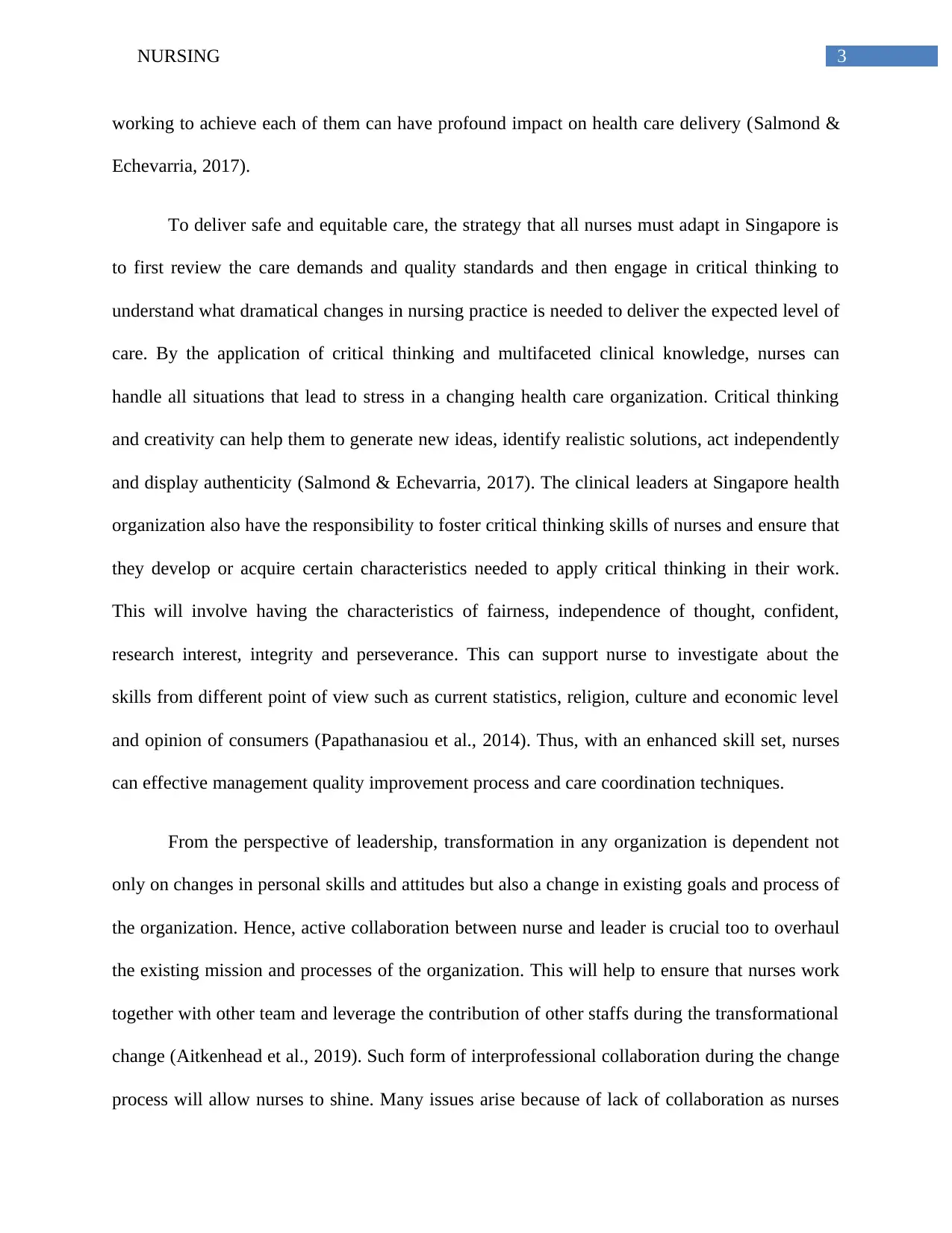
3NURSING
working to achieve each of them can have profound impact on health care delivery (Salmond &
Echevarria, 2017).
To deliver safe and equitable care, the strategy that all nurses must adapt in Singapore is
to first review the care demands and quality standards and then engage in critical thinking to
understand what dramatical changes in nursing practice is needed to deliver the expected level of
care. By the application of critical thinking and multifaceted clinical knowledge, nurses can
handle all situations that lead to stress in a changing health care organization. Critical thinking
and creativity can help them to generate new ideas, identify realistic solutions, act independently
and display authenticity (Salmond & Echevarria, 2017). The clinical leaders at Singapore health
organization also have the responsibility to foster critical thinking skills of nurses and ensure that
they develop or acquire certain characteristics needed to apply critical thinking in their work.
This will involve having the characteristics of fairness, independence of thought, confident,
research interest, integrity and perseverance. This can support nurse to investigate about the
skills from different point of view such as current statistics, religion, culture and economic level
and opinion of consumers (Papathanasiou et al., 2014). Thus, with an enhanced skill set, nurses
can effective management quality improvement process and care coordination techniques.
From the perspective of leadership, transformation in any organization is dependent not
only on changes in personal skills and attitudes but also a change in existing goals and process of
the organization. Hence, active collaboration between nurse and leader is crucial too to overhaul
the existing mission and processes of the organization. This will help to ensure that nurses work
together with other team and leverage the contribution of other staffs during the transformational
change (Aitkenhead et al., 2019). Such form of interprofessional collaboration during the change
process will allow nurses to shine. Many issues arise because of lack of collaboration as nurses
working to achieve each of them can have profound impact on health care delivery (Salmond &
Echevarria, 2017).
To deliver safe and equitable care, the strategy that all nurses must adapt in Singapore is
to first review the care demands and quality standards and then engage in critical thinking to
understand what dramatical changes in nursing practice is needed to deliver the expected level of
care. By the application of critical thinking and multifaceted clinical knowledge, nurses can
handle all situations that lead to stress in a changing health care organization. Critical thinking
and creativity can help them to generate new ideas, identify realistic solutions, act independently
and display authenticity (Salmond & Echevarria, 2017). The clinical leaders at Singapore health
organization also have the responsibility to foster critical thinking skills of nurses and ensure that
they develop or acquire certain characteristics needed to apply critical thinking in their work.
This will involve having the characteristics of fairness, independence of thought, confident,
research interest, integrity and perseverance. This can support nurse to investigate about the
skills from different point of view such as current statistics, religion, culture and economic level
and opinion of consumers (Papathanasiou et al., 2014). Thus, with an enhanced skill set, nurses
can effective management quality improvement process and care coordination techniques.
From the perspective of leadership, transformation in any organization is dependent not
only on changes in personal skills and attitudes but also a change in existing goals and process of
the organization. Hence, active collaboration between nurse and leader is crucial too to overhaul
the existing mission and processes of the organization. This will help to ensure that nurses work
together with other team and leverage the contribution of other staffs during the transformational
change (Aitkenhead et al., 2019). Such form of interprofessional collaboration during the change
process will allow nurses to shine. Many issues arise because of lack of collaboration as nurses
Paraphrase This Document
Need a fresh take? Get an instant paraphrase of this document with our AI Paraphraser
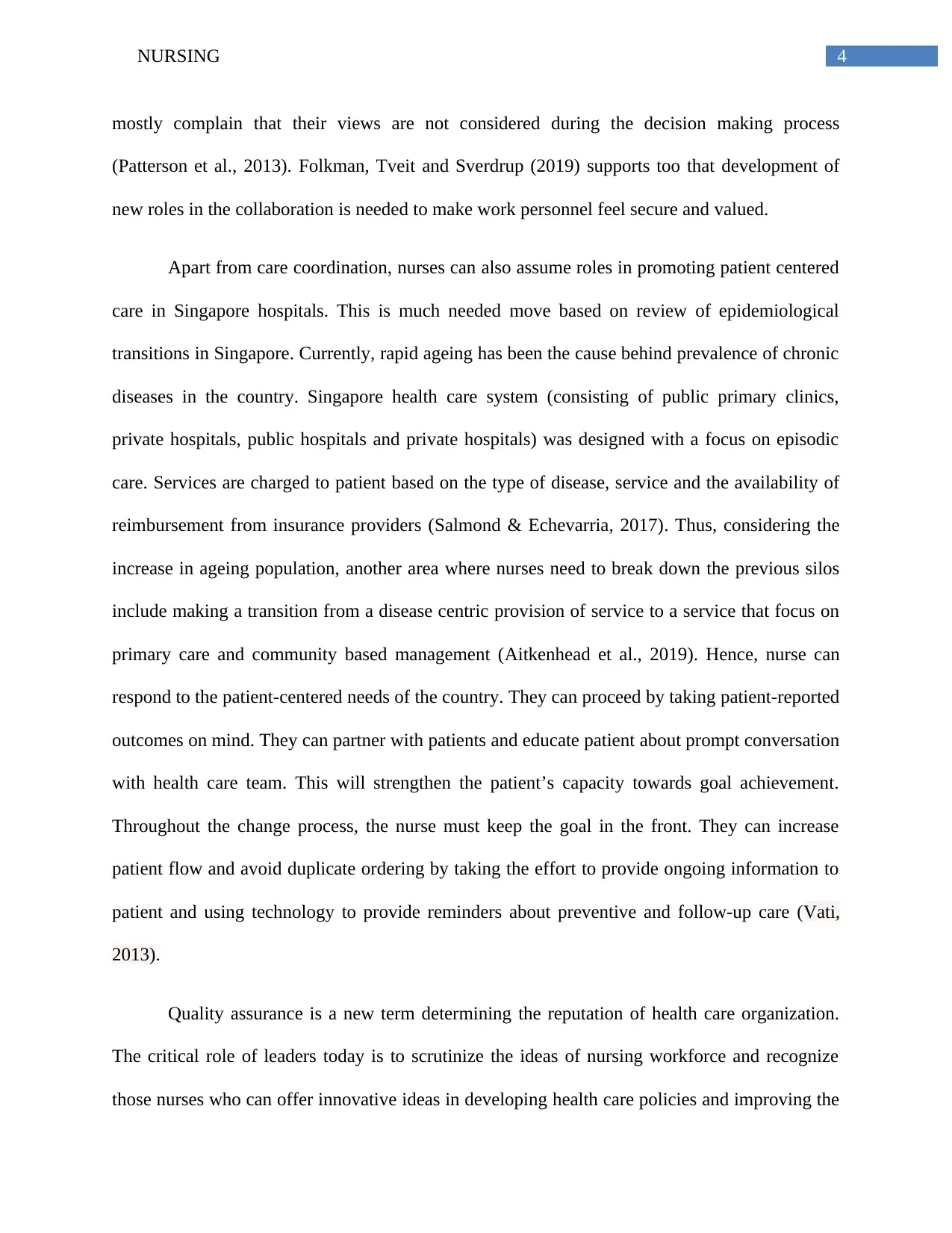
4NURSING
mostly complain that their views are not considered during the decision making process
(Patterson et al., 2013). Folkman, Tveit and Sverdrup (2019) supports too that development of
new roles in the collaboration is needed to make work personnel feel secure and valued.
Apart from care coordination, nurses can also assume roles in promoting patient centered
care in Singapore hospitals. This is much needed move based on review of epidemiological
transitions in Singapore. Currently, rapid ageing has been the cause behind prevalence of chronic
diseases in the country. Singapore health care system (consisting of public primary clinics,
private hospitals, public hospitals and private hospitals) was designed with a focus on episodic
care. Services are charged to patient based on the type of disease, service and the availability of
reimbursement from insurance providers (Salmond & Echevarria, 2017). Thus, considering the
increase in ageing population, another area where nurses need to break down the previous silos
include making a transition from a disease centric provision of service to a service that focus on
primary care and community based management (Aitkenhead et al., 2019). Hence, nurse can
respond to the patient-centered needs of the country. They can proceed by taking patient-reported
outcomes on mind. They can partner with patients and educate patient about prompt conversation
with health care team. This will strengthen the patient’s capacity towards goal achievement.
Throughout the change process, the nurse must keep the goal in the front. They can increase
patient flow and avoid duplicate ordering by taking the effort to provide ongoing information to
patient and using technology to provide reminders about preventive and follow-up care (Vati,
2013).
Quality assurance is a new term determining the reputation of health care organization.
The critical role of leaders today is to scrutinize the ideas of nursing workforce and recognize
those nurses who can offer innovative ideas in developing health care policies and improving the
mostly complain that their views are not considered during the decision making process
(Patterson et al., 2013). Folkman, Tveit and Sverdrup (2019) supports too that development of
new roles in the collaboration is needed to make work personnel feel secure and valued.
Apart from care coordination, nurses can also assume roles in promoting patient centered
care in Singapore hospitals. This is much needed move based on review of epidemiological
transitions in Singapore. Currently, rapid ageing has been the cause behind prevalence of chronic
diseases in the country. Singapore health care system (consisting of public primary clinics,
private hospitals, public hospitals and private hospitals) was designed with a focus on episodic
care. Services are charged to patient based on the type of disease, service and the availability of
reimbursement from insurance providers (Salmond & Echevarria, 2017). Thus, considering the
increase in ageing population, another area where nurses need to break down the previous silos
include making a transition from a disease centric provision of service to a service that focus on
primary care and community based management (Aitkenhead et al., 2019). Hence, nurse can
respond to the patient-centered needs of the country. They can proceed by taking patient-reported
outcomes on mind. They can partner with patients and educate patient about prompt conversation
with health care team. This will strengthen the patient’s capacity towards goal achievement.
Throughout the change process, the nurse must keep the goal in the front. They can increase
patient flow and avoid duplicate ordering by taking the effort to provide ongoing information to
patient and using technology to provide reminders about preventive and follow-up care (Vati,
2013).
Quality assurance is a new term determining the reputation of health care organization.
The critical role of leaders today is to scrutinize the ideas of nursing workforce and recognize
those nurses who can offer innovative ideas in developing health care policies and improving the
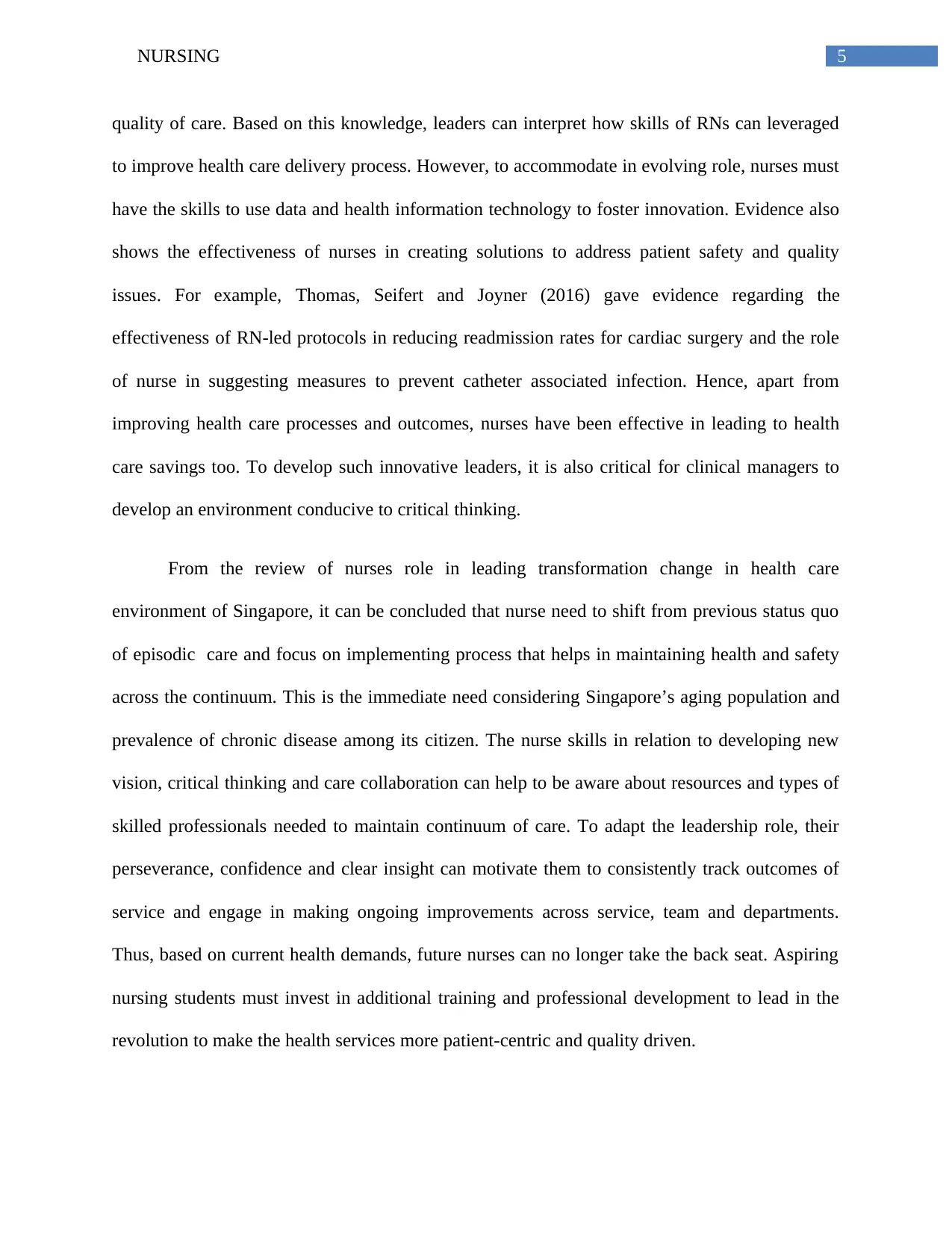
5NURSING
quality of care. Based on this knowledge, leaders can interpret how skills of RNs can leveraged
to improve health care delivery process. However, to accommodate in evolving role, nurses must
have the skills to use data and health information technology to foster innovation. Evidence also
shows the effectiveness of nurses in creating solutions to address patient safety and quality
issues. For example, Thomas, Seifert and Joyner (2016) gave evidence regarding the
effectiveness of RN-led protocols in reducing readmission rates for cardiac surgery and the role
of nurse in suggesting measures to prevent catheter associated infection. Hence, apart from
improving health care processes and outcomes, nurses have been effective in leading to health
care savings too. To develop such innovative leaders, it is also critical for clinical managers to
develop an environment conducive to critical thinking.
From the review of nurses role in leading transformation change in health care
environment of Singapore, it can be concluded that nurse need to shift from previous status quo
of episodic care and focus on implementing process that helps in maintaining health and safety
across the continuum. This is the immediate need considering Singapore’s aging population and
prevalence of chronic disease among its citizen. The nurse skills in relation to developing new
vision, critical thinking and care collaboration can help to be aware about resources and types of
skilled professionals needed to maintain continuum of care. To adapt the leadership role, their
perseverance, confidence and clear insight can motivate them to consistently track outcomes of
service and engage in making ongoing improvements across service, team and departments.
Thus, based on current health demands, future nurses can no longer take the back seat. Aspiring
nursing students must invest in additional training and professional development to lead in the
revolution to make the health services more patient-centric and quality driven.
quality of care. Based on this knowledge, leaders can interpret how skills of RNs can leveraged
to improve health care delivery process. However, to accommodate in evolving role, nurses must
have the skills to use data and health information technology to foster innovation. Evidence also
shows the effectiveness of nurses in creating solutions to address patient safety and quality
issues. For example, Thomas, Seifert and Joyner (2016) gave evidence regarding the
effectiveness of RN-led protocols in reducing readmission rates for cardiac surgery and the role
of nurse in suggesting measures to prevent catheter associated infection. Hence, apart from
improving health care processes and outcomes, nurses have been effective in leading to health
care savings too. To develop such innovative leaders, it is also critical for clinical managers to
develop an environment conducive to critical thinking.
From the review of nurses role in leading transformation change in health care
environment of Singapore, it can be concluded that nurse need to shift from previous status quo
of episodic care and focus on implementing process that helps in maintaining health and safety
across the continuum. This is the immediate need considering Singapore’s aging population and
prevalence of chronic disease among its citizen. The nurse skills in relation to developing new
vision, critical thinking and care collaboration can help to be aware about resources and types of
skilled professionals needed to maintain continuum of care. To adapt the leadership role, their
perseverance, confidence and clear insight can motivate them to consistently track outcomes of
service and engage in making ongoing improvements across service, team and departments.
Thus, based on current health demands, future nurses can no longer take the back seat. Aspiring
nursing students must invest in additional training and professional development to lead in the
revolution to make the health services more patient-centric and quality driven.
⊘ This is a preview!⊘
Do you want full access?
Subscribe today to unlock all pages.

Trusted by 1+ million students worldwide
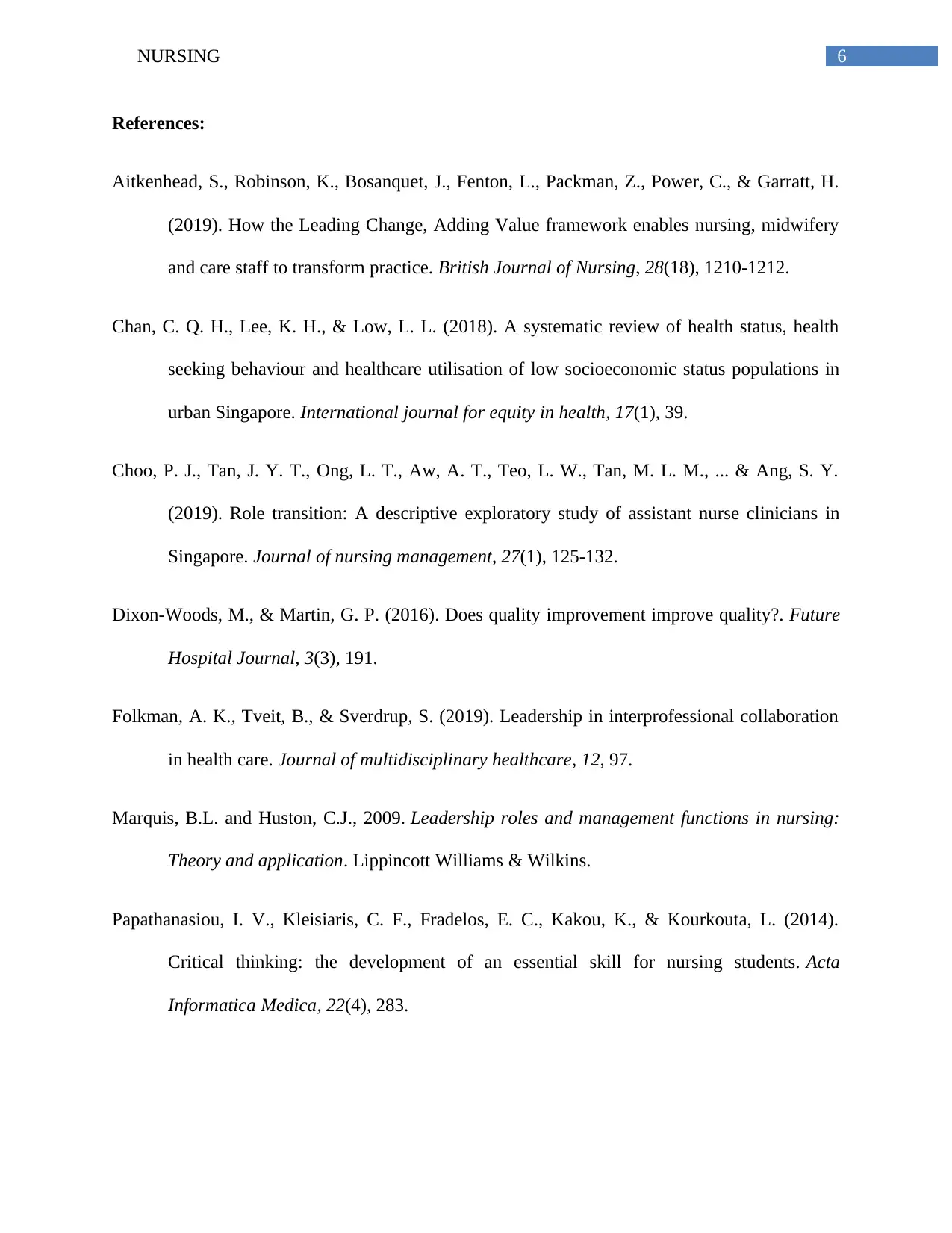
6NURSING
References:
Aitkenhead, S., Robinson, K., Bosanquet, J., Fenton, L., Packman, Z., Power, C., & Garratt, H.
(2019). How the Leading Change, Adding Value framework enables nursing, midwifery
and care staff to transform practice. British Journal of Nursing, 28(18), 1210-1212.
Chan, C. Q. H., Lee, K. H., & Low, L. L. (2018). A systematic review of health status, health
seeking behaviour and healthcare utilisation of low socioeconomic status populations in
urban Singapore. International journal for equity in health, 17(1), 39.
Choo, P. J., Tan, J. Y. T., Ong, L. T., Aw, A. T., Teo, L. W., Tan, M. L. M., ... & Ang, S. Y.
(2019). Role transition: A descriptive exploratory study of assistant nurse clinicians in
Singapore. Journal of nursing management, 27(1), 125-132.
Dixon-Woods, M., & Martin, G. P. (2016). Does quality improvement improve quality?. Future
Hospital Journal, 3(3), 191.
Folkman, A. K., Tveit, B., & Sverdrup, S. (2019). Leadership in interprofessional collaboration
in health care. Journal of multidisciplinary healthcare, 12, 97.
Marquis, B.L. and Huston, C.J., 2009. Leadership roles and management functions in nursing:
Theory and application. Lippincott Williams & Wilkins.
Papathanasiou, I. V., Kleisiaris, C. F., Fradelos, E. C., Kakou, K., & Kourkouta, L. (2014).
Critical thinking: the development of an essential skill for nursing students. Acta
Informatica Medica, 22(4), 283.
References:
Aitkenhead, S., Robinson, K., Bosanquet, J., Fenton, L., Packman, Z., Power, C., & Garratt, H.
(2019). How the Leading Change, Adding Value framework enables nursing, midwifery
and care staff to transform practice. British Journal of Nursing, 28(18), 1210-1212.
Chan, C. Q. H., Lee, K. H., & Low, L. L. (2018). A systematic review of health status, health
seeking behaviour and healthcare utilisation of low socioeconomic status populations in
urban Singapore. International journal for equity in health, 17(1), 39.
Choo, P. J., Tan, J. Y. T., Ong, L. T., Aw, A. T., Teo, L. W., Tan, M. L. M., ... & Ang, S. Y.
(2019). Role transition: A descriptive exploratory study of assistant nurse clinicians in
Singapore. Journal of nursing management, 27(1), 125-132.
Dixon-Woods, M., & Martin, G. P. (2016). Does quality improvement improve quality?. Future
Hospital Journal, 3(3), 191.
Folkman, A. K., Tveit, B., & Sverdrup, S. (2019). Leadership in interprofessional collaboration
in health care. Journal of multidisciplinary healthcare, 12, 97.
Marquis, B.L. and Huston, C.J., 2009. Leadership roles and management functions in nursing:
Theory and application. Lippincott Williams & Wilkins.
Papathanasiou, I. V., Kleisiaris, C. F., Fradelos, E. C., Kakou, K., & Kourkouta, L. (2014).
Critical thinking: the development of an essential skill for nursing students. Acta
Informatica Medica, 22(4), 283.
Paraphrase This Document
Need a fresh take? Get an instant paraphrase of this document with our AI Paraphraser
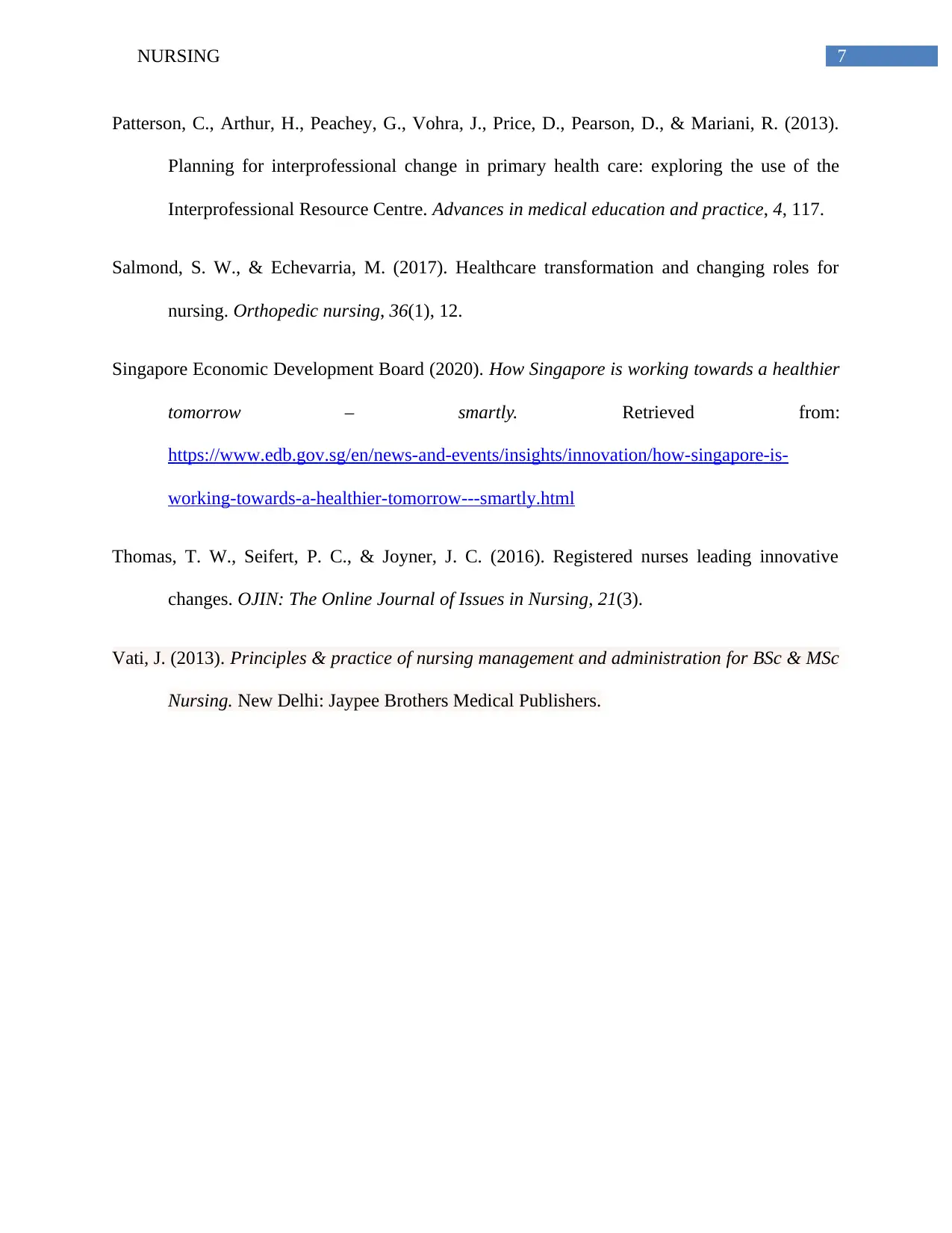
7NURSING
Patterson, C., Arthur, H., Peachey, G., Vohra, J., Price, D., Pearson, D., & Mariani, R. (2013).
Planning for interprofessional change in primary health care: exploring the use of the
Interprofessional Resource Centre. Advances in medical education and practice, 4, 117.
Salmond, S. W., & Echevarria, M. (2017). Healthcare transformation and changing roles for
nursing. Orthopedic nursing, 36(1), 12.
Singapore Economic Development Board (2020). How Singapore is working towards a healthier
tomorrow – smartly. Retrieved from:
https://www.edb.gov.sg/en/news-and-events/insights/innovation/how-singapore-is-
working-towards-a-healthier-tomorrow---smartly.html
Thomas, T. W., Seifert, P. C., & Joyner, J. C. (2016). Registered nurses leading innovative
changes. OJIN: The Online Journal of Issues in Nursing, 21(3).
Vati, J. (2013). Principles & practice of nursing management and administration for BSc & MSc
Nursing. New Delhi: Jaypee Brothers Medical Publishers.
Patterson, C., Arthur, H., Peachey, G., Vohra, J., Price, D., Pearson, D., & Mariani, R. (2013).
Planning for interprofessional change in primary health care: exploring the use of the
Interprofessional Resource Centre. Advances in medical education and practice, 4, 117.
Salmond, S. W., & Echevarria, M. (2017). Healthcare transformation and changing roles for
nursing. Orthopedic nursing, 36(1), 12.
Singapore Economic Development Board (2020). How Singapore is working towards a healthier
tomorrow – smartly. Retrieved from:
https://www.edb.gov.sg/en/news-and-events/insights/innovation/how-singapore-is-
working-towards-a-healthier-tomorrow---smartly.html
Thomas, T. W., Seifert, P. C., & Joyner, J. C. (2016). Registered nurses leading innovative
changes. OJIN: The Online Journal of Issues in Nursing, 21(3).
Vati, J. (2013). Principles & practice of nursing management and administration for BSc & MSc
Nursing. New Delhi: Jaypee Brothers Medical Publishers.
1 out of 8
Related Documents
Your All-in-One AI-Powered Toolkit for Academic Success.
+13062052269
info@desklib.com
Available 24*7 on WhatsApp / Email
![[object Object]](/_next/static/media/star-bottom.7253800d.svg)
Unlock your academic potential
Copyright © 2020–2025 A2Z Services. All Rights Reserved. Developed and managed by ZUCOL.





